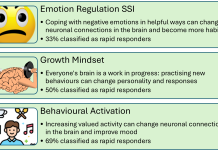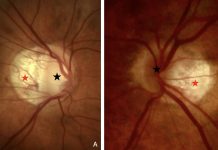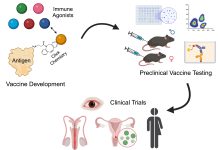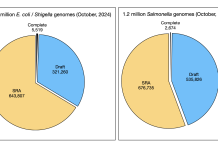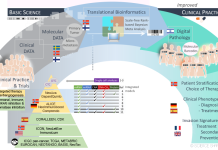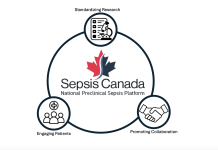Open Access Government produces compelling and informative news, publications, eBooks, and academic research articles for the public and private sector looking at health, diseases & conditions, workplace, research & innovation, digital transformation, government policy, environment, agriculture, energy, transport and more.
Home 2024
Archives
Joint manipulation, a hands-on therapeutic technique
Rob Sillevis from the Marieb College of Health and Human Services explores joint manipulation, a hands-on therapeutic technique designed to relieve pain, improve mobility, restore joint function, and enhance patient functionality.
Early intervention for eating disorders
Tracey Wade, Matthew Flinders Distinguished Professor, provides an insightful examination of the significance of brief early interventions in the treatment of eating disorders.
Suicidal thoughts and actions: We need a new model
Konrad Michel, MD, Psychiatrist from the University of Bern, Switzerland, discusses the clinical approach to suicidal patients, providing a new look at a human phenomenon.
Spotting peripapillary intra-choroidal cavitation using OCT
Adèle Ehongo explores the potential of optical coherence tomography for diagnosing peripapillary intra-choroidal cavitation in myopic eyes.
Advancing vaccine development for chlamydia
Genital Chlamydia trachomatis infection is a significant public health burden; Professor of Pediatrics and Microbiology and Immunology, Toni Darville, discusses the potential efficacy of CPAF-adjuvanted vaccines in mitigating the spread and impact of the infection.
The future of personalised cardiovascular disease detection and monitoring
Professor Allan Lawrie from Imperial College London, discusses the future of personalised cardiovascular disease detection and monitoring, including comment on wearable technology and AI.
E. coli genomes, big data, and messy biology
Here, David Ussery from the Department of BioMedical Informatics, UAMS, details E. coli genome diversity, big data, and messy biology. New methods, we discover, allow for the comparison of millions of bacterial genomes in a few days and the confident assignment of taxonomic clusters.
A novel approach to cancer chemotherapy
Richard F. Ludueña, Professor Emeritus at the University of Texas Health San Antonio, discusses his innovative approach to cancer chemotherapy, which could significantly enhance its effectiveness.
Fuelling the global supply of medical radioisotopes for cancer care
European research reactors play a crucial role in producing medical radioisotopes using nuclear fuel and are transitioning to Low Enriched Uranium (LEU) to meet non-proliferation commitments and global demand. Jared Wight tells us how he and his colleagues are working to ensure a smooth conversion to LEU fuels.
Empowering voices: Breaking mental health stigma
John Hoey and Mary Cannon from Department of Psychiatry, RCSI University of Medicine and Health Sciences, Dublin, Ireland, share their research around breaking mental health stigma to empower voices.
A call to action: Supporting our nursing workforce through improved transition to practice
Dr. Kathryn Halverson, Assistant Professor in the Department of Nursing at Brock University, issues a call to action and a plea for help, urging us to listen to what new nurses are saying.
The future of AVS, dizziness, and vertigo in emergency departments Part IV: Priorities for...
In the fourth article of this five-part series, Dr Millie Nakatsuka discusses how reform must be integrated into the broader context of the public health landscape.
Fish hearts expose toxic truth about our cardiovascular health
Professor Holly Shiels, from the University of Manchester, is the Director of the Company of Biologists and the President of the Fisheries Society of the British Isles. She charts a toxic tide by tracing the path of pollutants from fish hearts to human cardiovascular health.
Stem cell therapy for osteoarthritis: Functional cartilage regeneration using 3d bioprinting technology
Osteoarthritis presents a significant societal and economic burden. Stina Simonsson from the University of Gothenburg explains how EU-funded projects are using 3D bioprinting to create functional cartilage for OA treatment.
Breast cancer prevention: Precision medicine and health
Biobank Norway Project experts chart the journey from precision medicine to precision health when it comes to breast cancer prevention.
Mobilizing pain care knowledge in Canada
Norm Buckley and Jason Busse from the Michael G. DeGroote Institute for Pain Research & Care discuss the mobilization of knowledge about the pain environment in Canada, focusing on the role of an ad hoc community-based organization.
Protecting cancer survivors across Europe from financial discrimination: The right to be forgotten
Mark Lawler and Françoise Meunier highlight the financial discrimination that many cancer survivors face despite being cured of their disease and propose a data-informed legal solution so that cancer patients are not punished for a previous cancer diagnosis.
Advancing knowledge about criminal justice and mental health
Researchers with expertise in criminal law, philosophy, psychiatry and psychology are combining their knowledge to explore how mental disorders are approached within criminal law and contribute to better legal and forensic practices.
Making preclinical sepsis research stronger, faster, and more responsive to patients
Sepsis represents a significant global burden. The National Preclinical Sepsis Platform (NPSP) is leading vital sepsis research, informing policy, driving innovation, and ultimately saving lives.
Seasonality and climate change: Challenges for physical activity in older adults
Research indicates seasonal variations in physical activity levels among adults in different climates due to temperature and humidity. Climate change’s increasing extreme weather may significantly affect physical activity in older adults already struggling to meet activity guidelines. Isabelle J. Dionne from the Université de Sherbrooke explains.


